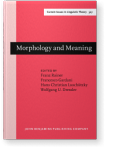Indirect coding
Morphologically and syntactically conditioned alternations indirectly code their conditioner. The distinction between semantic information that is coded by a property of an expression and semantic information that conditions and constrains a property of an expression brings rigor into linguistic description and makes us understand an important mechanism of interpretation and reanalysis of linguistic structure. The paper provides a theoretical basis for describing indirect coding both on the paradigmatic and on the syntagmatic axis, but then focuses on syntagmatically mediated coding.
